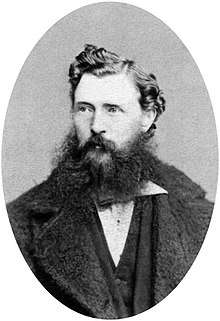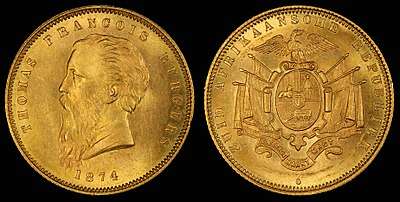Thomas François Burgers
Thomas François Burgers (15 April 1834 – 9 December 1881) was the 4th president of the South African Republic from 1872 to 1877. He was the youngest child of Barend and Elizabeth Burger of the farm Langefontein in the Camdeboo district of Graaff Reinet, Cape Colony.
Thomas François Burgers | |
|---|---|
 | |
| 4th State President of the South African Republic | |
| In office 1 July 1872 – 12 April 1877 | |
| Preceded by | M.W. Pretorius |
| Succeeded by | None (British annexation) |
| Personal details | |
| Born | 15 April 1834 Langefontein, Graaff-Reinet, Cape Colony |
| Died | 9 December 1881 (aged 47) Richmond, Cape Colony |
| Resting place | Heroes' Acre, Pretoria, Gauteng, South Africa |
| Spouse(s) | Mary Bryson (1836-1929) |
| Alma mater | Utrecht University |
| Occupation | Christian minister |
Biography
After studying theology at the University of Utrecht in the Netherlands, Burgers became the parson of Hanover, South Africa in 1859. A charmingly eloquent, but fiercely individualistic man, he had been influenced by Professor C. W. Opzoomer in the Netherlands and embraced his rationalist, liberal ideas.
Burgers quickly became involved in a stormy controversy with the Dutch Reformed Synod over his alleged liberalism and disbelief in the literal truth of the Bible. He was critical of traditional culture and strongly emphasised knowledge and rationalism. In 1862, his unorthodox doctrine brought on him an accusation of heresy, and in 1864, he was found guilty by the Synod and suspended. The Supreme Court overturned the decision, and in 1865, he was readmitted to the ministry. Some of his liberal theological ideas and his diverting viewpoints can be found in the sketches he wrote about daily life in Hanover.[1][2]
The burghers of the South African Republic urged Burgers to stand for the presidency, and he was elected by the considerable majority of 2,964 to 388 in 1872.
The South African Republic's first coins—the famous Burgerspond—was introduced in 1874. These were struck at Heaton's Mint in Birmingham, England when he was there on a visit. Some people in the South African Republic objected to the issue of the Burgerspond, because the portrayal of the President on coins likened him to a dictator.
The 1905 New International Encyclopædia describes Burgers' policies as president as “characterized by brilliant but impracticable schemes, aiming chiefly at territorial expansion.”[3] One of his plans, inspired by the neighbouring Cape Prime Minister John Molteno's massive railway programme, was to build a railway linking the Transvaal to the sea. In 1875 he traveled to Europe to raise funds, but his plans were thwarted by the Pedi chief Sekhukhune, whose lands lay in the path of the proposed railway.[4]
By 1877, Burgers was very unpopular and his government was insolvent. Britain, keen on expanding their empire, stepped in and annexed the Transvaal. Burgers retired from political life, settled in the Cape Colony again, and died in 1881, only forty-seven years old, and leaving his family destitute. Coming to the family's aid, Burgers' former private secretary, Th.M. Tromp, published the sketches Burgers had written about his experiences as minister in Hanover. The proceeds of the book, in Dutch and published in the Netherlands, were used to alleviate his family's financial problems.[2] He was a South African Freemason.[5]
He ended his days disheartened and in poverty. His body was disinterred in 1895, to be reburied in the Pretoria cemetery now known as the Heroes' Acre.[6]
See also
Bibliography
- Burgers, Th.F. (1882). Toneelen uit ons dorp. Den Haag: Henri J. Stemberg.
- Burgers, Th.F.; Wium van Zyl (ed.) (2008). Tonele uit ons dorp. Kaapstad: Africana Uitgewers.CS1 maint: extra text: authors list (link)
References
| Wikisource has the text of the 1911 Encyclopædia Britannica article Burgers, Thomas François. |
Notes
- Burgers. Toneelen uit ons dorp.
- de Jong-Goossens. "Menselijk en overtuigend: de dorpstonelen van Burgers": 78–79. Cite journal requires
|journal=(help) - Gilman, D. C.; Peck, H. T.; Colby, F. M., eds. (1905). . New International Encyclopedia (1st ed.). New York: Dodd, Mead.
- Bond, J. (1956). "The Makers of Railways". They were South Africans. London: Oxford University Press.
- Kleijn, A. "Voortrekkers, generaals en presidente was vrymesselaars". Bronberger newspaper. Retrieved 14 September 2018.
- Webster, Roger (2003), At the fireside: true South African stories, 2, Spearhead Press, p. 27, ISBN 0-86486-536-8
Literature
- de Jong-Goossens, Riet (April 2008). "Menselijk en overtuigend: de dorpstonelen van Burgers". Maandblad Zuid-Afrika. 85 (4): 78–79.
